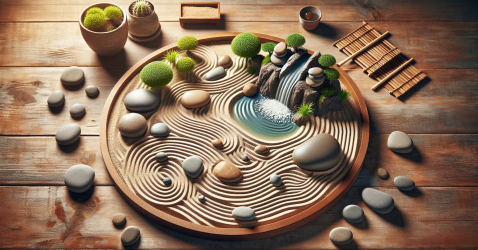Herbal Harmony: Self-Care With Herbal Teas
Imagine a world where you can unwind and reconnect with yourself in the simplest way possible – with a cup of herbal tea. In our busy lives, it’s easy to forget the importance of self-care, but with herbal teas, you can effortlessly infuse your day with tranquility and wellness. From soothing chamomile to invigorating peppermint, join us on a journey to discover the wonders of herbal harmony and how these aromatic brews can bring balance and rejuvenation to your life. So sit back, relax, and let us guide you through the realm of self-care with herbal teas.
Benefits of Herbal Teas
Herbal teas have been used for centuries as natural remedies for various health concerns. One of the key benefits of herbal teas is their ability to provide stress relief. The soothing properties of certain herbal teas, such as chamomile, lavender, and passionflower, can help you relax and unwind after a long day. Sipping on a warm cup of herbal tea can create a sense of calm and tranquility, allowing you to let go of stress and tension.
In addition to stress relief, herbal teas can also help improve digestion. Peppermint and ginger tea, for example, are known for their digestive benefits. These herbs can help soothe an upset stomach, reduce bloating, and alleviate indigestion. By incorporating these teas into your daily routine, you can support a healthy digestive system and promote overall wellbeing.
Another significant advantage of herbal teas is their ability to boost immunity. Certain herbal teas, such as echinacea, lemon and ginger, and nettle tea, contain compounds that can strengthen your immune system. These teas are rich in antioxidants and vitamins, which play a crucial role in protecting your body against potential illnesses and infections. By regularly drinking these teas, you can give your immune system a natural boost and enhance your overall health.
Different Types of Herbal Teas
When it comes to herbal teas, there is a wide variety to choose from. Each type of tea offers unique flavors and benefits, catering to different preferences and needs. Here are some popular types of herbal teas:
Chamomile Tea
Chamomile tea is one of the most well-known herbal teas and is renowned for its calming properties. It can help alleviate anxiety and promote better sleep. Chamomile tea has a delicate floral taste, making it a soothing and enjoyable beverage option.
Peppermint Tea
Peppermint tea is refreshing and invigorating with a cool minty flavor. It is often used to aid digestion, relieve headaches, and reduce nausea. This tea is particularly beneficial after a heavy meal or during periods of gastrointestinal discomfort.
Ginger Tea
Ginger tea is known for its warming and spicy flavor. It can help with digestion, reduce inflammation, and alleviate symptoms of nausea, such as morning sickness or motion sickness. Ginger tea is a versatile option that can be enjoyed both hot and cold.
Lemon Balm Tea
Lemon balm tea has a bright and citrusy flavor, making it a refreshing beverage choice. This tea is often used to promote relaxation, reduce anxiety, and improve sleep quality. Lemon balm tea can be enjoyed throughout the day, especially during times of stress.
Choosing and Preparing Herbal Teas
To fully enjoy the benefits of herbal teas, it is essential to choose high-quality herbs and prepare them correctly.
Selecting High-Quality Herbs
When selecting herbal teas, look for organic and sustainably sourced herbs to ensure their purity and freshness. Check for reputable brands or purchase directly from local herbalists or trusted suppliers. By choosing high-quality herbs, you can ensure that you’re getting the maximum benefits from your tea.
Proper Brewing Techniques
Proper brewing techniques are essential for extracting the beneficial compounds from the herbs. Here are some general guidelines:
- Boil water and then remove it from the heat source.
- Add one tablespoon of dried herbs or one tea bag per cup of water.
- Pour the hot water over the herbs and cover the container.
- Allow the tea to steep for the recommended time (usually 5-10 minutes).
- Strain the herbs or remove the tea bag.
- Sweeten with honey or add lemon if desired.
- Enjoy your herbal tea while it’s still warm.
By following these simple steps, you can ensure that your herbal teas are flavorful and potent, providing you with the maximum benefits.
Herbal Tea Blends for Specific Purposes
Herbal tea blends can be created to address specific health concerns or provide targeted benefits. By combining different herbs, you can create unique and effective blends. Here are some popular herbal tea blends for specific purposes:
Sleep Aid Blend
To promote better sleep and relaxation, consider blending chamomile, lavender, and valerian root. Chamomile and lavender have calming properties, while valerian root aids in sleep regulation. This blend can help you unwind and prepare for a restful night’s sleep.
Digestive Health Blend
If you’re looking to improve digestion, a blend of peppermint, ginger, and fennel can be beneficial. Peppermint and ginger have soothing effects on the digestive system, while fennel helps alleviate bloating and gas. This blend can support a healthy digestive process and alleviate discomfort.
Immune-Boosting Blend
To give your immune system a natural boost, consider blending echinacea, lemon, and ginger. Echinacea is known for its immune-stimulating properties, while lemon and ginger provide antioxidants and vitamins. This blend can help strengthen your immune system and protect against common infections.
Herbal Teas for Stress Relief
After a long and hectic day, herbal teas can help you find a moment of peace and calm. Here are some herbal teas that are specifically known for their stress-relieving properties:
Chamomile and Lavender Tea
A blend of chamomile and lavender can create a soothing and aromatic tea that promotes relaxation. Chamomile calms the mind, while lavender helps relieve anxiety and stress. Sipping on this tea can help you unwind and find tranquility before bedtime.
Valerian Root Tea
Valerian root has been used for centuries as a natural remedy for anxiety and insomnia. By brewing valerian root as a tea, you can harness its calming effects and promote a deep state of relaxation. It is best enjoyed before bed to help prepare your body and mind for a restful night’s sleep.
Passionflower Tea
Passionflower is known for its sedative properties and can help alleviate symptoms of anxiety and stress. Brewing passionflower as a tea can provide a sense of calm and relaxation. Sip on this tea during periods of high stress or when you need a moment of tranquility.
Herbal Teas for Improved Digestion
If you often experience digestive issues, incorporating certain herbal teas into your routine can be highly beneficial. Here are some herbal teas that are known for promoting improved digestion:
Peppermint and Ginger Tea
A blend of peppermint and ginger can aid digestion and relieve discomfort. Peppermint helps soothe an upset stomach, while ginger aids in digestion and reduces bloating. This blend can be enjoyed after meals to support a healthy digestive system.
Fennel Tea
Fennel tea has been used for centuries to help ease digestive problems such as flatulence and bloating. It can also stimulate digestion and alleviate stomach cramps. Drinking fennel tea regularly can help promote a healthy and balanced digestive system.
Dandelion Root Tea
Dandelion root tea is a natural diuretic and has liver-detoxifying properties. It can help improve overall digestion by supporting liver function and assisting in the breakdown of fats and proteins. Incorporating dandelion root tea into your routine can aid in digestion and promote better nutrient absorption.
Herbal Teas for Boosted Immunity
To strengthen your immune system and ward off illnesses, certain herbal teas can provide a natural boost. Here are some herbal teas known for their immune-boosting properties:
Echinacea Tea
Echinacea is commonly used to enhance the immune system and fight off infections. Brewing echinacea as a tea can help increase the production of white blood cells, which play a vital role in defending against pathogens. Enjoying a cup of echinacea tea regularly can fortify your immune system.
Lemon and Ginger Tea
A combination of lemon and ginger provides a powerful blend of antioxidants and immune-boosting properties. Lemon is rich in vitamin C, while ginger possesses antimicrobial and anti-inflammatory properties. This tea can help support your immune system and protect against common illnesses.
Nettle Tea
Nettle tea is packed with vitamins, minerals, and antioxidants, making it an excellent choice for boosting immunity. It helps strengthen the immune system and supports overall health. Regular intake of nettle tea can provide your body with the essential nutrients it needs to fight off infections and stay healthy.
Herbal Tea Recipes for Self-Care
Creating your own herbal tea blends can be a wonderful way to practice self-care and indulge in a personalized beverage. Here are some herbal tea recipes for different self-care purposes:
Relaxation Blend
Ingredients:
- 1 part chamomile
- 1 part lavender
- 1 part lemon balm
Instructions:
- Mix equal parts of chamomile, lavender, and lemon balm in a bowl.
- Store the blend in an airtight container.
- To prepare, steep one tablespoon of the blend in a cup of hot water for 5-10 minutes.
- Strain the herbs and enjoy a relaxing cup of tea.
This blend combines the calming properties of chamomile, lavender, and lemon balm to help you unwind and find tranquility.
Digestive Soothing Blend
Ingredients:
- 2 parts peppermint
- 1 part ginger
- 1 part fennel
Instructions:
- Combine the peppermint, ginger, and fennel in a container.
- Mix thoroughly to create a well-blended blend.
- To brew a cup, add one tablespoon of the blend to a cup of hot water.
- Allow the tea to steep for 5-10 minutes.
- Strain and enjoy the soothing effects of this digestive tea blend.
This blend is designed to promote healthy digestion and relieve gastrointestinal discomfort.
Immune-Boosting Elixir
Ingredients:
- 2 parts echinacea
- 1 part lemon
- 1 part ginger
Instructions:
- Mix the echinacea, lemon, and ginger in a bowl until well combined.
- Store the blend in an airtight container.
- To prepare, add one tablespoon of the blend to a cup of hot water.
- Let the tea steep for 5-10 minutes.
- Strain and enjoy the immune-boosting properties of this elixir.
This elixir combines the immune-stimulating properties of echinacea with the antioxidants and anti-inflammatory effects of lemon and ginger.
Using Herbal Teas for Overall Well-being
Incorporating herbal teas into your daily routine can have a positive impact on your overall well-being. Here are some ways you can make the most of herbal teas:
Incorporating Tea Rituals into Daily Routine
Create a tea ritual that allows you to slow down, relax, and enjoy the moment. Carve out a few minutes each day to prepare a cup of herbal tea mindfully. Use this time as an opportunity to check-in with yourself, practice gratitude, or simply meditate. By incorporating tea rituals into your daily routine, you can nurture your body and mind.
Exploring Different Herbal Tea Varieties
Experiment with different herbal tea varieties to discover new flavors and benefits. Don’t be afraid to step out of your comfort zone and try teas that you haven’t tasted before. Take note of how each tea makes you feel and which ones resonate with your body. Exploring the world of herbal teas can be an exciting and enriching experience.
Consulting with Herbalists and Professionals
If you have specific health concerns or are unsure about which herbal teas to choose, consider consulting with herbalists or healthcare professionals. They can provide personalized guidance based on your needs and help you select the most suitable herbal teas for your well-being.
Precautions and Safety Measures
While herbal teas are generally considered safe, it is essential to be aware of potential interactions and take precautions, especially if you have underlying health conditions. Here are some key considerations:
Understanding Potential Interactions
Certain herbs used in herbal teas may interact with medications or have contraindications for specific health conditions. If you are taking any medications or have pre-existing health conditions, it is important to consult with a healthcare professional before incorporating herbal teas into your routine. They can provide guidance on any potential interactions or contraindications to ensure your safety.
Pregnancy and Breastfeeding Considerations
Pregnant and breastfeeding individuals should exercise caution when consuming herbal teas. Some herbs may be contraindicated during pregnancy or while breastfeeding. It is best to consult with a healthcare professional before consuming herbal teas during these periods to ensure the safety of both you and your baby.
In conclusion, herbal teas offer a wide range of benefits for both physical and mental well-being. From stress relief to improved digestion and boosted immunity, these natural remedies can enhance your overall health. By exploring different herbal tea varieties, creating personalized blends, and incorporating tea rituals into your daily routine, you can embrace the power of herbal teas for self-care and holistic wellness. Remember to take precautions, consult with professionals when needed, and enjoy the soothing and nourishing experience of herbal teas.

















